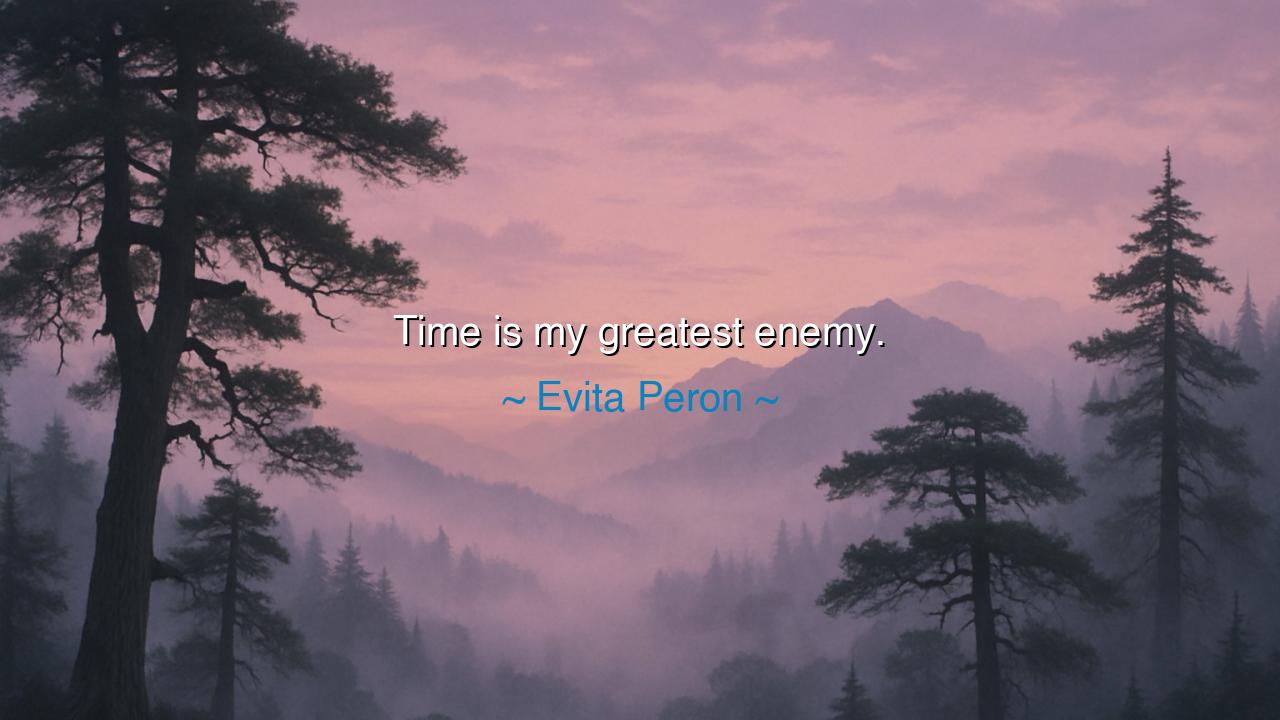
Time is my greatest enemy.






“Time is my greatest enemy.” — Eva Perón
In the vast chronicle of human existence, there is no adversary more silent, more patient, and more certain than Time. Empires crumble before it, beauty fades beneath its touch, and even the proudest hearts bow to its rhythm. When Evita Perón, the luminous soul of Argentina, uttered these words — “Time is my greatest enemy” — she did not speak as a queen lamenting her waning power, but as a mortal woman confronting the eternal truth that no one escapes the passing of the hours. Her cry was not of vanity, but of passion — the passion of one who burned too brightly, too briefly, and who knew that Time would one day extinguish even the fiercest flame.
Evita, adored by millions, rose from the dust of poverty to the heights of glory. She became the voice of the voiceless, the champion of the workers, the beloved “Spiritual Leader of the Nation.” But within her radiant life, Time stalked her like a shadow. She fell ill while her people adored her most; her strength waned as her fame soared. To Evita, Time was not an abstraction — it was the cruel hand that tore her from her mission before it was complete. She had given her body to her people, her spirit to her nation, but Time, relentless and unmerciful, demanded both in return.
Throughout history, heroes and dreamers have waged war against Time. Alexander the Great, though master of the known world, wept because there were no more worlds to conquer — and yet Time conquered him. Cleopatra, the last Pharaoh, sought immortality through beauty and brilliance, yet her legend endured only as long as Time allowed. Even the poets — those who write to defy oblivion — find that their words, though carved into eternity, can never halt the turning of the heavens. For Time is not a foe one can defeat; it is a truth one must understand.
And yet, in the heart of Evita’s lament lies a hidden strength. To say that Time is one’s enemy is to declare that life itself is precious — that every breath, every heartbeat, every dawn is sacred. Only those who truly live fear Time’s theft, for they have something worth losing. It is not indifference that breeds this cry, but devotion — devotion to one’s purpose, to one’s people, to the beauty of existence itself. Evita’s struggle was not against death, but against unfinished love — the desire to do more, give more, be more, before Time’s curtain fell.
There is an old story told of a samurai who knew his death would come at sunrise. All night he wrote letters to those he loved, trained with his sword, and gazed at the stars. When morning came, he bowed to the east and said, “If I must die, then let me die complete.” In that moment, he ceased to be at war with Time, for he had filled every instant with meaning. So too can we learn from Evita’s cry — that the enemy we cannot defeat may yet be the teacher that perfects us. For Time, though merciless, gives us urgency; it teaches us to cherish the fleeting and to live with purpose before the hourglass runs dry.
The lesson is this: do not curse Time, but consecrate it. Do not waste the hours waiting for the perfect moment — there is none. Act now. Speak kindly now. Build, love, create, serve — now. For each passing day is both a thief and a gift. Like Evita, you may one day feel the weight of your own unfinished dreams pressing against the walls of mortality. But unlike those who fear the end, you can greet it with the grace of one who lived fully, fiercely, and without regret.
In the end, Time may indeed be our greatest enemy, but it is also our greatest sculptor. It shapes the soul as the river carves the stone. It reminds us that immortality is not found in the length of years, but in the depth of deeds. Evita’s body withered, but her voice still echoes in the hearts of her people. So too may yours — if you live with such fire that even Time must pause to remember your light.






AAdministratorAdministrator
Welcome, honored guests. Please leave a comment, we will respond soon